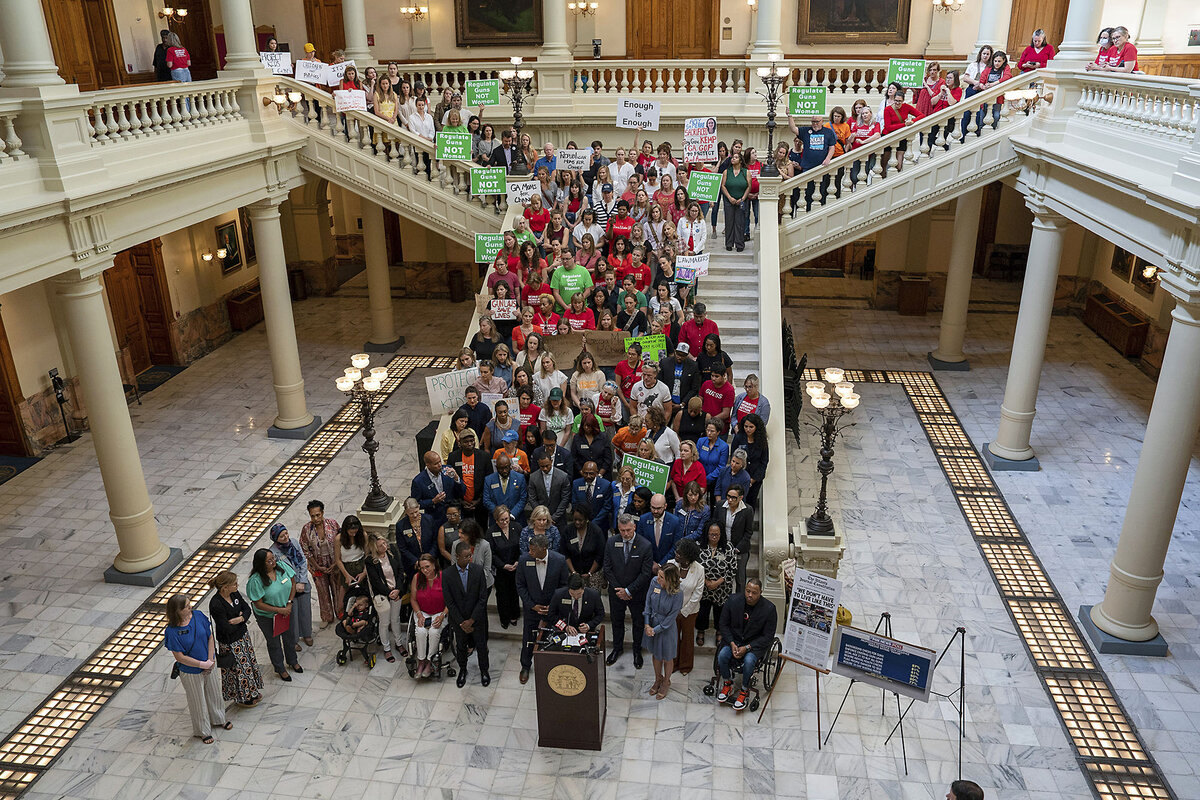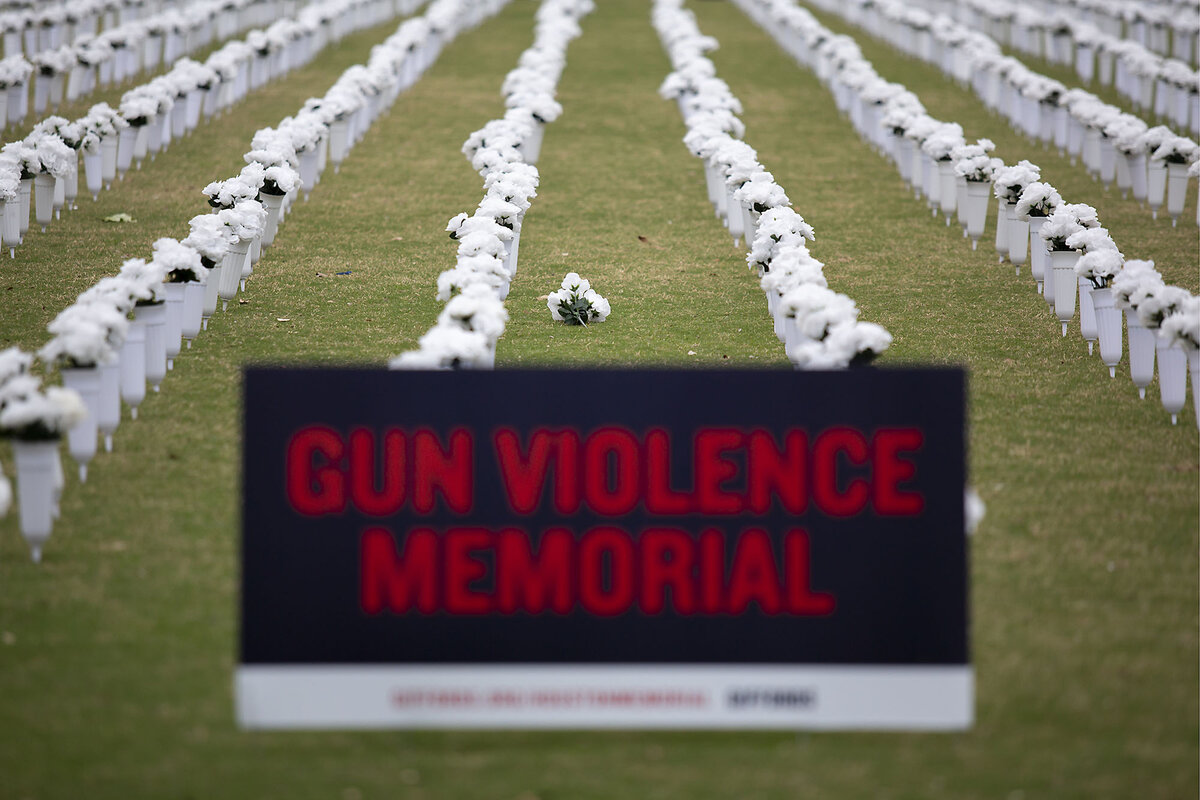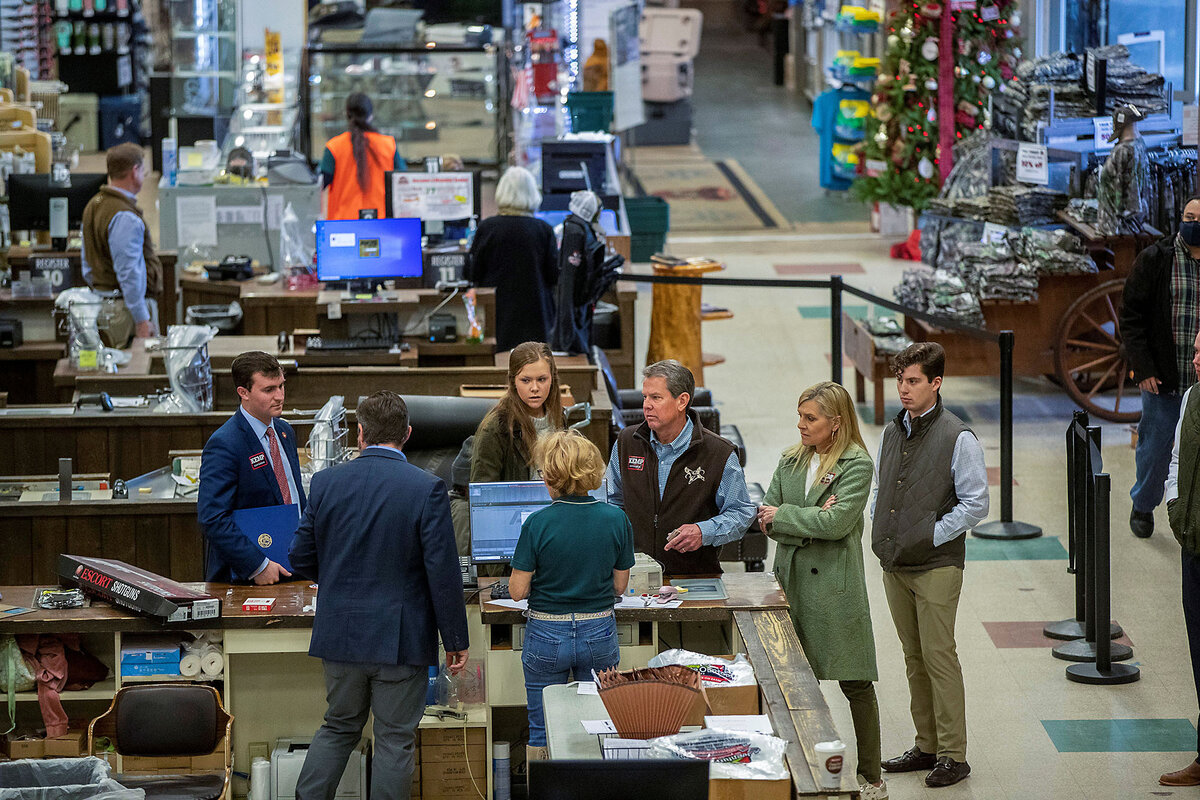Jail time for leaving gun in an unlocked car? Cities nudge states on firearm laws.
Loading...
| Savannah, Ga.
In April, the City Council of Savannah, Georgia, passed an ordinance making it illegal to store a gun in an unlocked car, punishable by up to 30 days in jail. Some 233 guns were stolen from cars here last year.
But Savannah is swimming upstream. Georgia has removed any permitting and training requirements for public gun carry, just as the potential for citizens to carry weapons has grown. American gun manufacturers made 11 million guns in 2020, double the 2010 number, say government officials.
Why We Wrote This
A story focused onU.S. state and local officials are increasingly at odds over which gun laws – if any – will improve citizen safety. One divide: whether states will even allow cities to try some policies on their own.
“When you allow [weapons] to be everywhere, you can’t be surprised when they show up,” Savannah Mayor Van Johnson said at a recent press conference.
The struggle to address evolving norms around guns is particularly challenging for blue cities in red states, where state laws can shackle municipalities’ leeway to act.
Some cities like Savannah are trying to pass modest gun restrictions. In the process, they are drawing lawsuits – and testing state laws that preempt local action on the issue.
In the blue state of Illinois, by contrast, the Evanston City Council last year passed the Safe Storage Act, making gun owners potentially liable when their weapons are used by others to commit crimes.
Late one recent Saturday night, one of Savannah’s famously moss-draped squares exploded in gunfire. Eleven people were wounded; none died.
Four people have now been arrested in the hunt for the Ellis Square shooters. But a larger question looms for cities like Savannah, Georgia, a mostly Democratic city in a Republican-led state. As American gun laws ease and weapon production increases, what role, if any, do local lawmakers have in making sure people handle weapons responsibly?
In April, Savannah’s City Council unanimously passed an ordinance making it illegal to store a gun in an unlocked car, punishable by up to 30 days in jail. Some 233 guns were stolen from cars here last year.
Why We Wrote This
A story focused onU.S. state and local officials are increasingly at odds over which gun laws – if any – will improve citizen safety. One divide: whether states will even allow cities to try some policies on their own.
But Savannah is swimming upstream. One man from Jesup, Georgia, has already filed suit against Savannah, citing a law that allows citizens to sue cities that enact gun ordinances. The state has at the same time removed any permitting and training requirements for public gun carry. Meanwhile, American gun manufacturers made 11 million guns in 2020, twice the number a decade earlier, according to the Bureau of Alcohol, Tobacco, Firearms and Explosives, a Justice Department domestic law enforcement agency.
“When you allow [weapons] to be everywhere, you can’t be surprised when they show up,” Mayor Van Johnson of Savannah said at a recent press conference.
States hold upper hand over cities
The struggle to address evolving norms around guns is particularly challenging for blue cities in red states, where looser state laws are shackling municipalities’ ability to address public safety around guns.
Forty-two states, covering 72% of the U.S. population, now have “right to carry” laws that allow people 18 and older to carry a gun without a concealed weapons permit training.
That has left cities from Savannah to Columbus, Ohio, to Philadelphia struggling with how a permissive gun culture can lead to community-shattering results.
“Cities ... understandably want to fight back against that,” says Adam Winkler, a professor and author of “Gunfight: The Battle Over the Right To Bear Arms in America.”
The debate has intensified as gun violence spiked during the pandemic. Though violent crime across the United States has ticked down since then, it remains above the prepandemic average.
In states with tighter carry rules, about 9% of gun owners report carrying their weapons with them on a regular basis. In states like Georgia, about 20% of gun owners carry their guns with them. Georgia law does bar those who have felony convictions from carrying guns. It also allows law enforcement to report specific mental health records into the background check system.
“One way around the ... impasse between gun violence and enacting stricter gun laws is to have flexibility at the local level,” says Robert Spitzer, author of “The Gun Dilemma: How History Is Against Expanded Gun Rights.” “It’s short-sighted of the Georgia state government to not let Savannah do some of these things,” he says.
Meanwhile the number of guns, particularly semiautomatic-style weapons, has exploded, experts say. Often they are in untrained or criminal hands. That surge has come as the Supreme Court has made guns harder to regulate and states have relaxed gun laws and bolstered self-defense laws.
Florida, for example, can fine local officials who pass gun laws $5,000. In 2021, Texas Gov. Greg Abbott signed a set of laws that turned the Lone Star State into a “sanctuary state” for gun rights, expressly prohibiting state agencies and local governments from enforcing any new gun laws.
Patterns of gun violence by state
Gun rights proponents say increased gun violence is rooted in liberal policies that make it harder for police to root out crime.
“If more people are carrying guns, there will be an occasional incident involving otherwise law-abiding people,” says John Monroe, a gun rights lawyer in Dawsonville, Georgia. “But that’s at the fringe.”
Yet some research finds that gun proliferation – legal as well as illegal – drives gun violence.
A January 2024 Rand Corp. analysis found that gun prevalence results in higher gun violence rates. Increased gun carry also leads to the Savannah problem: more gun thefts. More than a million guns were reported stolen between 2017 and 2021, according to Justice Department data.
Conversely, experts say, states that allow cities and towns to pass gun laws – such as Hawaii, Massachusetts, and New Jersey – have the lowest per capita gun violence rates for the U.S.
In states like Georgia, which prohibits gun regulation, violence has become more pervasive.
One example: Before 2020, some 36% of all Atlantans lived less than a quarter mile from a fatal shooting. During the pandemic years, that rose to 58%, according to a recent New York Times investigation.
Local empowerment in Illinois and Colorado
The looser the state’s overall gun laws, the less effective a city’s regulations will be, says Stanford University law professor John Donohue. But passing even marginal restrictions can yield benefits, he says.
That seems to be the direction many cities are going. In the process, they are testing state laws preempting local action and a U.S. Supreme Court ruling that shifted defending gun laws onto the government.
Columbus Mayor Andrew Ginther in 2022 declared gun violence a public health crisis. But he quickly got tangled in Ohio state preemption challenges.
That same year, Philadelphia Mayor Jim Kenney signed an executive order banning all firearms from local parks facilities. The state’s preemption law made the order unenforceable.
But there have also been successes.
Last year, the Evanston City Council successfully passed the Safe Storage Act, making gun owners potentially liable when their weapons are used by others to commit crimes.
In 2021, a court blocked a Boulder, Colorado, assault weapons ban. Two weeks later, a man used such a weapon to kill 10 people at a Boulder grocery store. Later that year, Colorado became the first – and so far the only – state to give regulatory power back to communities.
For Savannah, “the real question is, why is the state so opposed to the fact that people would have to lock guns in cars when we know people steal them?” says Professor Winkler, who teaches constitutional law at UCLA.
Still, Savannah’s new ordinance “may be primarily a political point,” he adds. “It’s hard to imagine how this law would have a huge effect on gun violence even if enforced. There are already so many guns in Savannah.”











